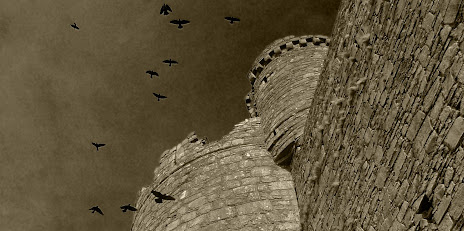As they marched out of Nuon Raban’s mind was racing. They strode in single file and he was kept in the middle. All the while time Charlemagne kept pace with them, flitting from branch to branch, and Raban saw the men keeping a wary eye on the rook. The soldier in front of Raban was a gritty and degraded looking fellow, but more importantly, Raban saw he had a dagger at his belt, loose in the sheath. He edged as close as possible but could not reach it with his bound wrists. Every time he got his fingers near, it his feet tangled with the soldiers and there was a bout of curses.
In desperation he reached hastily forward, but just as he touched the handle, the man stopped dead still. Raban crashed into him and they tumbled to the ground in a tangle.
“Get off, maggot,” the soldier yelled, heaving Raban away. After bouncing roughly across the dirt, for his hands could not ease the fall, Raban scrambled to his feet and did his best to appear lowly. With a few more muttered curses, the man-at-arms got back in line and they all proceeded again. Raban glanced at the man behind him and then to the front. As subtle as he could, he began working the dagger into the rope between his wrists. It was difficult and awkward, and he was terrified of dropping the dagger, but he succeeded in cutting through the last thread of the rope. He hid the dagger up his sleeve and continued on. On they walked and he bided his time, waiting the opportune moment.
“What was that?” said Raban, jerking to a stop and peering off into the trees. “There’s a wolf or two in that stand of trees.”
“There never was a wolf around here in the daytime,” the captain said, but they all gazed into the thicket nonetheless. Raban crouched and snatched up a stone, dropped his bonds, and belted the nearest man over the head. Pulling out the dagger, he turned and wedged it into another’s thigh. Before the rest could see what happened or heed their fellow’s scream, he took off at a dead sprint. At a full run Raban ducked and dodged the branches and trunks. Vaguely, he heard the soldiers clamoring along behind. He looked back and saw a black shape streaking low through the branches. Charlemagne was keeping up with of him, executing his own maneuvers to dodge through the thicket trees while flying so fast.
But Raban had no time to think on his rook. One of the men was also keeping pace with him. They tore through the brush at full speed, the man unable to stop and string his bow or he would fall behind. Still they ran, neither gaining nor losing on the other. The rest of the company was left far behind and still they streaked through the wood, jumping logs and ducking branches. Something grabbed at Raban’s foot and he rolled in the moss. He was up again before he even slowed from his fall and bolted on. Then the archer was closer than he had been. After a moment more he was closer still, and Raban’s speed began to flag. Up ahead he saw Ragno’s hill, then Ragno himself sitting before his fire. Gasping for breath, Raban sped toward him and saw Ragno leap up, drawing a short sword. Raban tripped again and tumbled wildly. In the middle of his fall, as he as he stood on his head, he saw the archer leap into the clearing and Ragno strike him through the body. Raban finished his fall and a shriek froze the air as he slid to a halt. He rose to his knees and retched.
“Why so white? Haven’t you ever killed a man before?” Ragno was grinning at the dead man twitching gently at his feet.
Raban opened his mouth but found he could not say no and turned away without speaking. Charlemagne swooped down and landed heavily on Raban’s shoulder.
By the way, I just thought I'd mention that I'm open to any criticism anyone feels like giving. I'm not just here for the praise, you know. But I'm more interested in impressions that people receive when they read my stuff, not so much craft advice or things like, "You used the word 'on' twice in row". Though I wouldn't mind that kind of thing, I'm more interested in impressions right now.




3 comments:
I liked it. Ok, criticism, lets see. Well you could use a little (and I mean a little) more detail. Other wise I can't think of anything.
woo hoo for you uncle cory ! critisism? i don't like the retching part you could have him gag or faint . if you don't change it thats ok with me .
I'm coming to this rather late, but... I can picture the action fairly well. Did I miss the part where he actually got hold of the knife? Unusual and humorous combination of words "twitching gently." It matches the humor that pops up throughout (at least the parts you've let me read)
Post a Comment